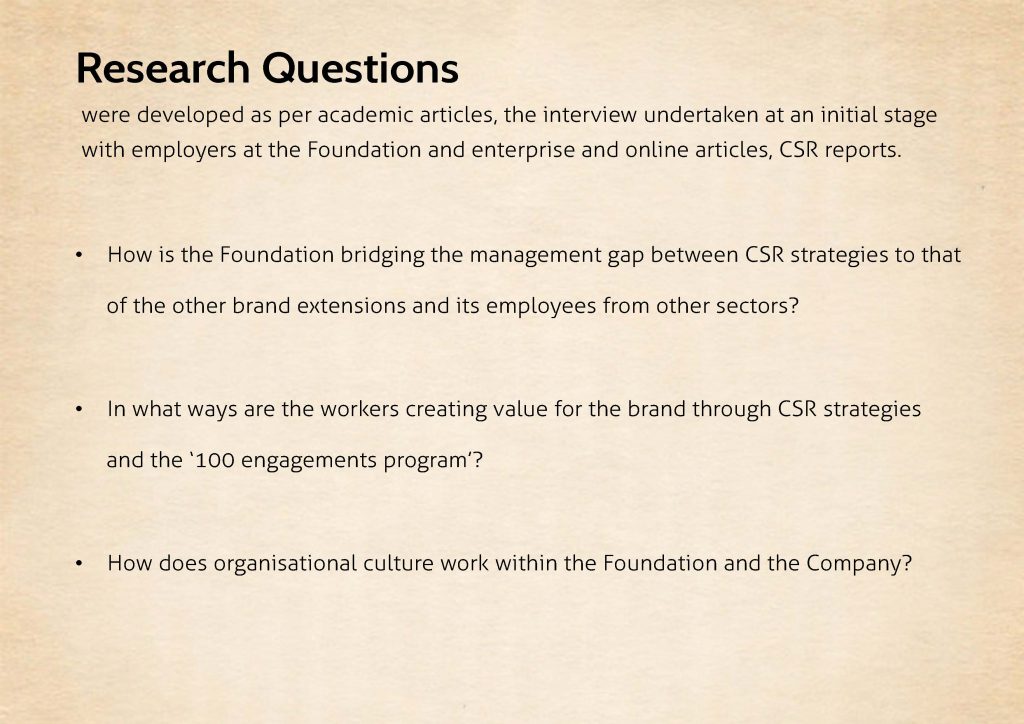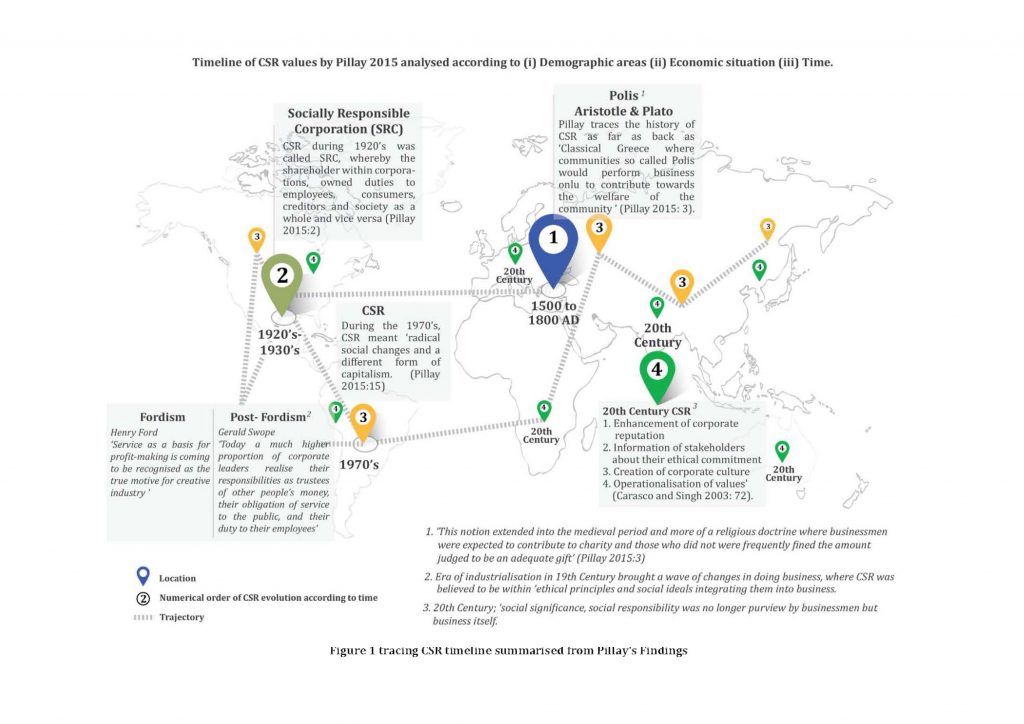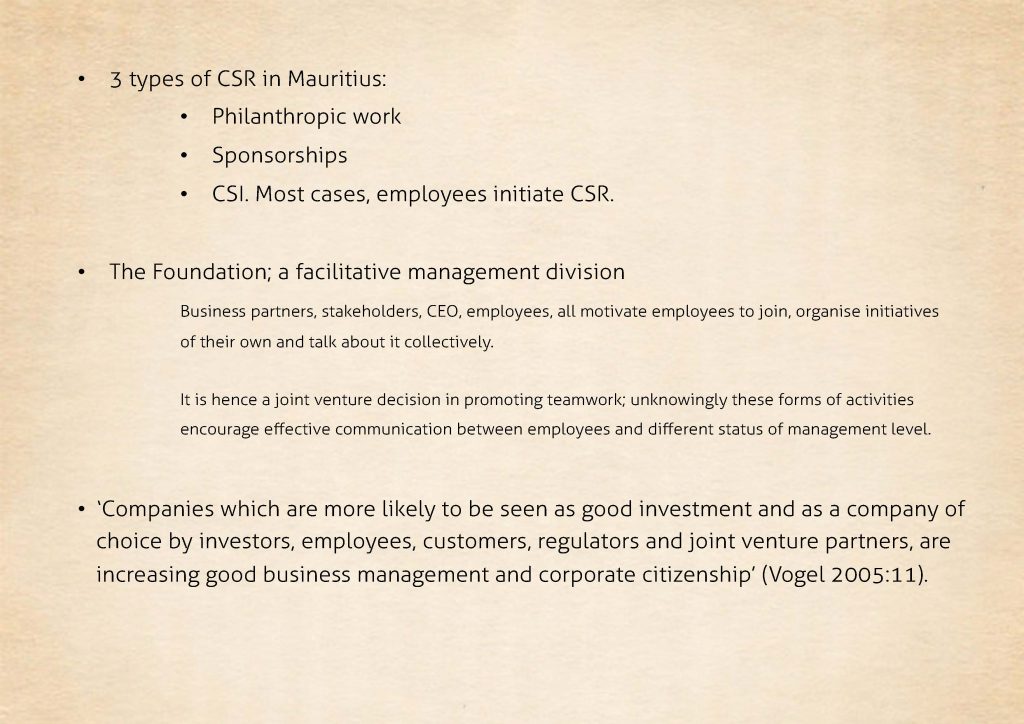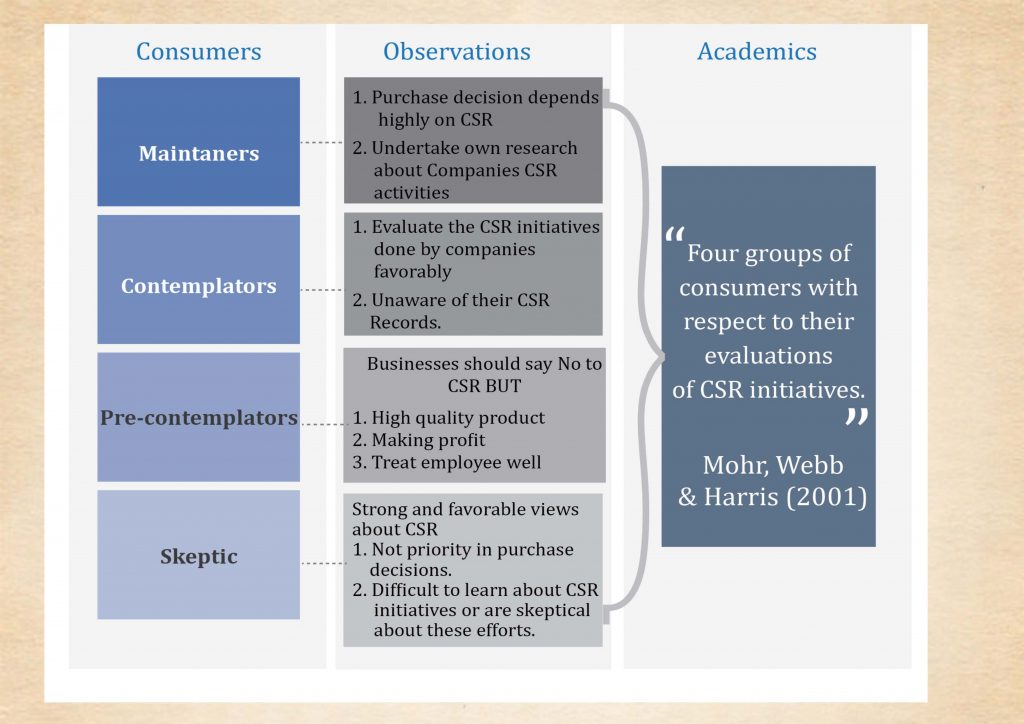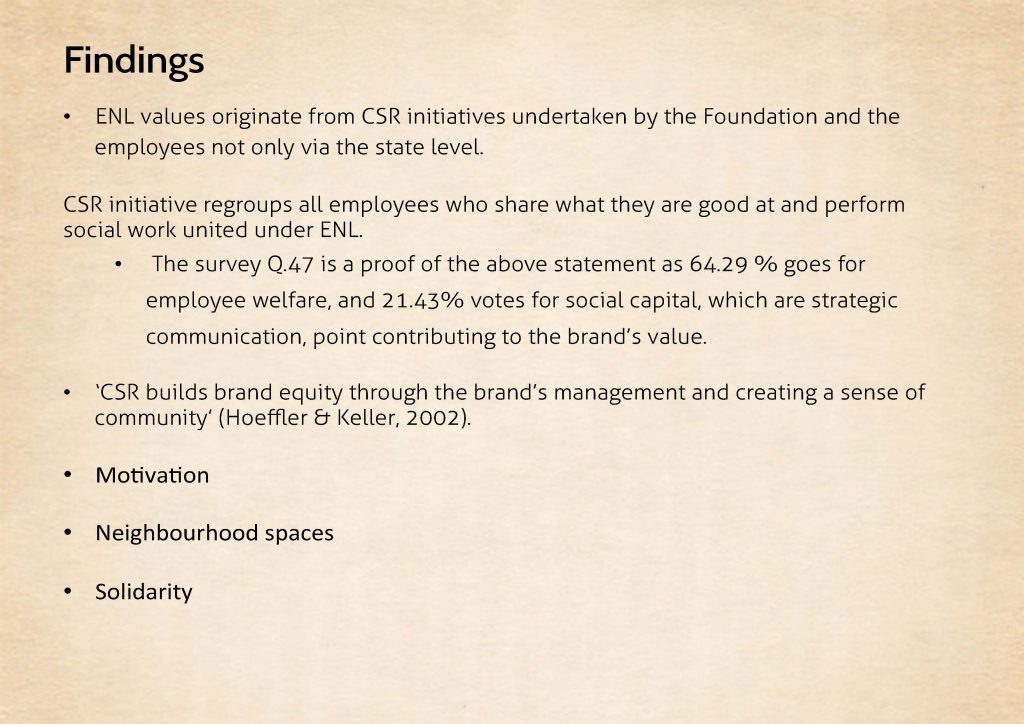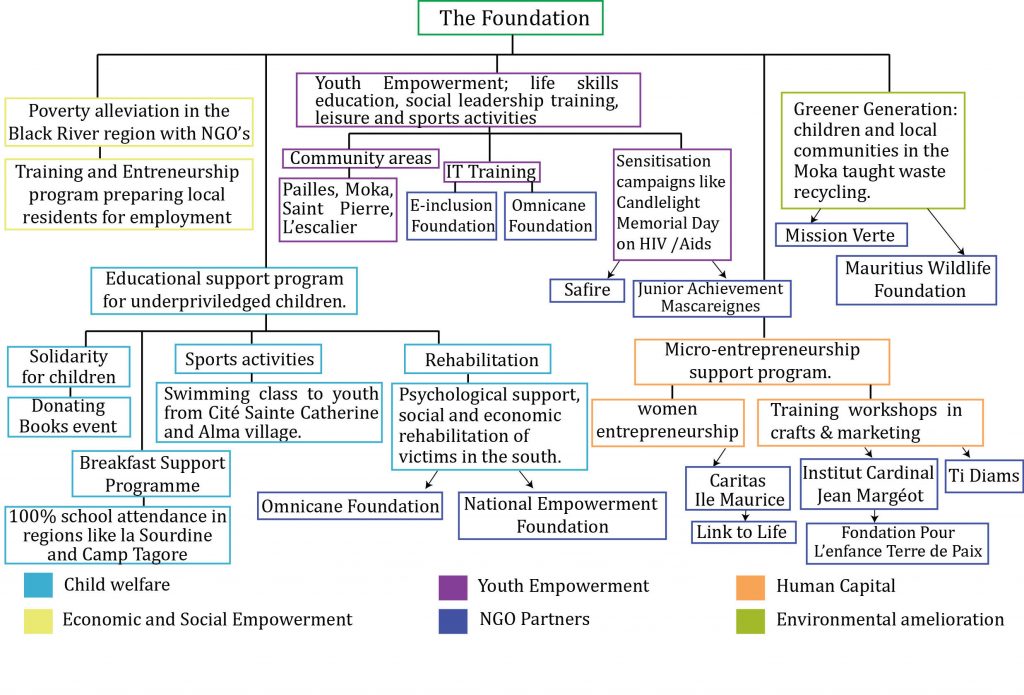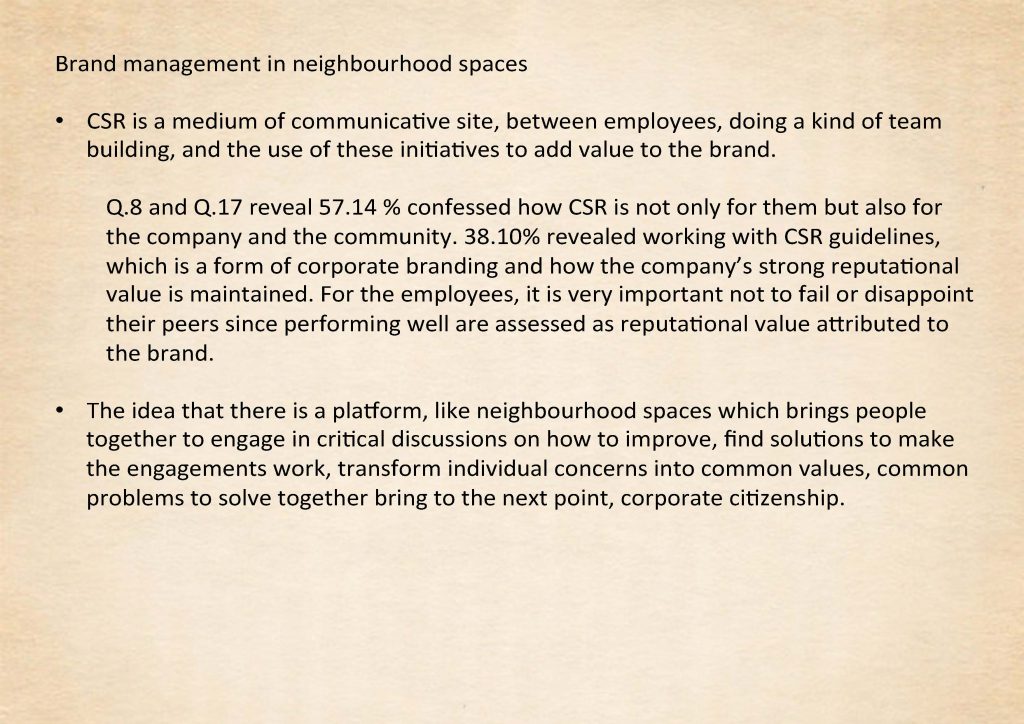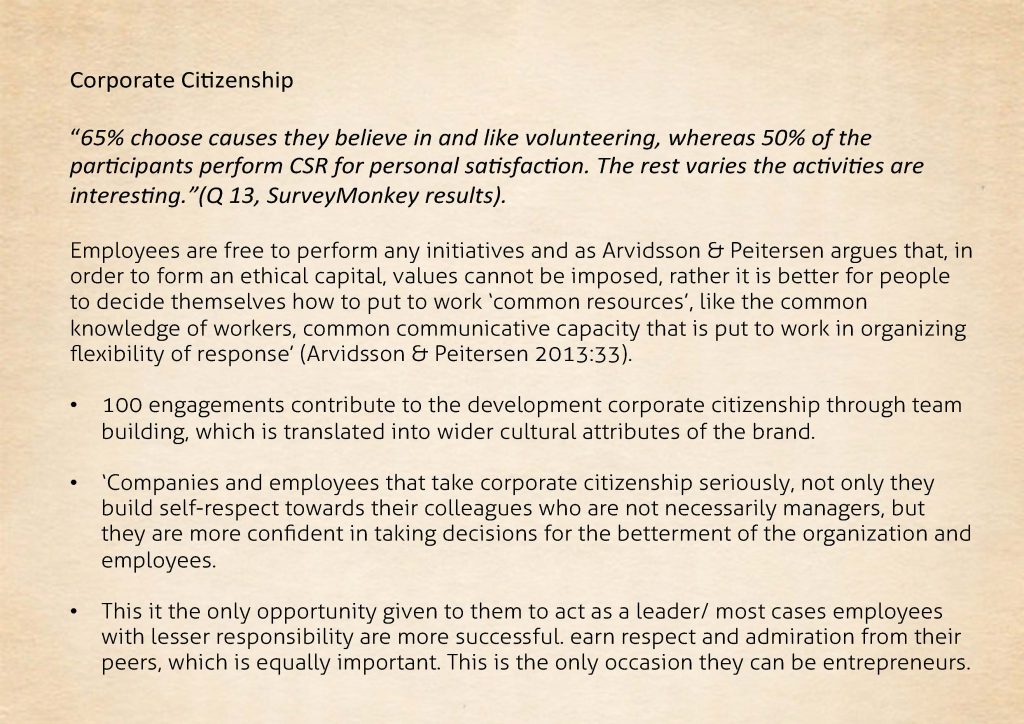What is the relationship between Corporate Social Responsibility and brand management, within a developing economy, Mauritius? Case study of a Foundation in Mauritius 2015.
What is the relationship between Corporate Social Responsibility and brand management, within a developing economy, Mauritius? Case study of a Foundation in Mauritius 2015.
Consumers and businesses are adopting CSR as a new value regime with the rise of globalisation and neoliberalism. This paper explores the dimensions of a brand’s CSR department within a macro economic structure, Mauritius. The case study of a successful Mauritian enterprise, driven by ethical and secured investments of Rs 10 million[1] in areas like youth development, child welfare, employee engagement, preservation of the natural environment; hence caring for the growth of sustainable local communities. The dissertation provides strong theoretical background from interview analysis, as primary research, which eventually contributed to formulating research questions using annual reports, CSR law documents[2] and information on company’s website. The brand’s values originate from CSR initiatives undertaken by the Foundation and the employees who according to Arvidsson and Peitersen 2013, are ‘productive publics’ whereby the ‘conduct of organizational members and general sentiment’ are vital for the organisation’s culture and the brand. The Fordist era where ‘old factory paradigm’ was prevailing, is now replaced by ‘socialised networks of productive collaboration’, converging towards ethical capital (Arvidsson 2013). The employees’ response through a survey brought a coherent and informative overview of the potential and limitations of CSR. I will analyse the structural and macro-economic condition that are favoring the adoption of CSR within the case study.
Keywords
Corporate Social Responsibility, Branding, Developing Economy, Mauritius, Organisational Culture, Transparency, Brand Values.
[1] Appendix pg 20
- http://tinyurl.com/nnbne9a link shared from MRA website
The inspiration behind my topic came from the fact that our resources are at stake in Mauritius. Inhabitants are facing indisputable issues like severe poverty, unemployment. Considering Mauritius is branded as a touristic place and globalisation coasting our shores, businesses are finding it an advantage to settle in Mauritius since it enjoys a degree of social harmony and economic stability. All private and public sector are abiding to the CSR Law 2009 by contributing 2% of their annual profit to eradicate social issues.
My dissertation will investigate how CSR and brand management are interdependent, contributing towards the development of an economy, Mauritius. My past experience as a graphic designer exposed me into designing aesthetic sponsorship documents for NGO’s and CSR reports rather than focusing on its content analysis. Eventually the course made a strategic difference in strengthening the weightage of NGO or CSR report. It is a full fledge package with market research, design auditing derived from transparency and strategic brand management.
First I describe the terms developing economy, CSR and brand management in relation to my case study. Mauritius, as a developing economy reflects the trajectory of an island that battled for independence and grew out of a ‘strongly dependent plantation-based production’ (Dommen 1968) to a ‘knowledge based-economy’ by exporting professional services (Mistry and Treeboohun 2009). CSR adoption in a developing economy contributes in improving the ‘governance, social, ethical, labour and environmental conditions of the island while remaining sensitive to prevailing religious, historical and cultural contexts’ (Visser et al., 2007). In the literature review, there are extensive references about the importance of brands’ contribution to economic stability, brand management and CSR. It begins by proposing different perspectives of brands adapting not only to consumer’s demand but also realising how resources are valuable.
The rationale behind this topic comes from a lack of research material to explain how brands are implementing CSR in Mauritius. Often not providing in-depth information about the social initiatives can result as a ‘green wash’ whereby questions start to undermine the real motivation behind brands affiliated to CSR. Chapter 4 emphasises on CSR as a contribution towards making Mauritius an economic model. The conclusion from this chapter was that each country needs to contextualise their own CSR strategic guidelines with respect to its society’s needs and problems.
The CSR Law was introduced to the population in the Budget speech 2009[1], which encouraged companies to not only generate economic profit but also pursue social and ethical capital. Chapter 4 breaks down the political and economic situation before and after the CSR Law was devised. This form of privatisation, questions the capacity of the Government to ensure social welfare at the state level. Questions about the legitimacy of the CSR Law and Companies aspirations to respect the values of human dignity are being researched. Only a minority of firms is actually using CSR as a means to drive innovation forward. My case study, a conglomerate business extending its brands, helps in maintaining a competitive market and profit, which is invested in CSR.
The Foundation; the company’s CSR vehicle, takes initiatives on board and injects free entrepreneurial activities within the workers, through the ‘100 engagements program’.
Questions regarding my case study were formulated partially from the above statement and the brand’s intention in setting a Foundation. Having sketched a broad overview of the economic situation and bringing an insight of the Mauritian CSR law, I address my research questions:
- Does the Foundation act as a facilitator between the brand and the National CSR Committee?
- How does the National CSR Committee monitor the CSR initiatives undertaken within the organisation?
- Who is the Foundation accountable to if they are not able to measure the results of their initiatives and how do they negotiate then?
- Can the Government’s implementation of the CSR turn privatisation at the state level?
- How is the Foundation bridging the management gap between CSR strategies to that of the other brand extensions and its employees from other sectors?
- Does the Foundation push the immaterial form of labour into converging a social relationship of production?
- In what ways are the workers creating value for the brand through CSR strategies and the ‘100 engagements program’?
- How does organizational culture work within the Foundation and the Company?
Through my research and my literature review, I look at academic contributions in the field of CSR developments in Mauritius under the company’s initiatives and start by analysing the values generated from the employees and their concerns. My empirical research covers qualitative and quantitative methods used to answer my research questions. Finally the findings cover my analysis of the results gathered with support to my theoretical framework.
[1] http://www.investmauritius.com/media/170912/FinanceAct2009.pdf under Act 21. Income Tax Act Amended, Section 50 K

